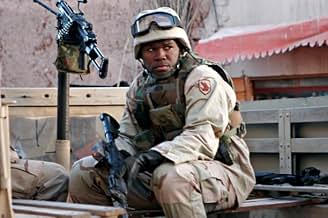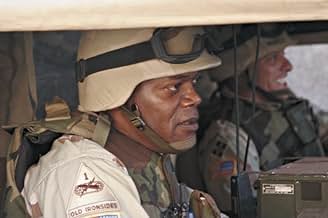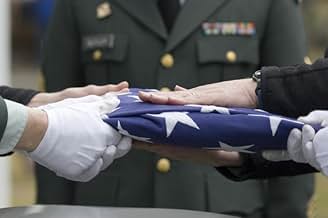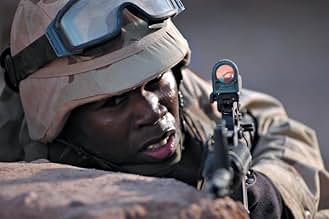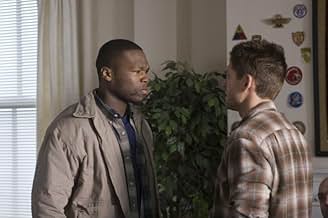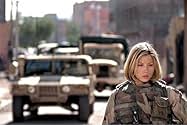NOTE IMDb
5,6/10
11 k
MA NOTE
Ajouter une intrigue dans votre langueThree soldiers struggle to readjust to life at home after returning home from a lengthy tour in Iraq.Three soldiers struggle to readjust to life at home after returning home from a lengthy tour in Iraq.Three soldiers struggle to readjust to life at home after returning home from a lengthy tour in Iraq.
- Réalisation
- Scénario
- Casting principal
- Récompenses
- 4 nominations au total
50 Cent
- Jamal Aiken
- (as Curtis Jackson)
Jeffrey Nordling
- Cary
- (as Jeff Nordling)
Avis à la une
A better title would be "Home of the Made-for-TV Movie"--You'd have to be from the "home of the brave film critics" to sit trough this laundry list of post-traumatic syndrome clichés. Three Iraq veterans return to face a civilian world that doesn't understand and personal demons that won't let them forget the ungodly carnage they lived through. But nothing is new or unique, no dialogue is incisive, no action is memorable.
The film does remind us about how unfair the whole Iraq invasion is to the soldier, who not only must suffer the damages to limb, life, and psyche but must also face a hostile electorate which carries little of the respect and patriotism that welcomed soldiers back from WWII. In this way, director Irwin Winkler achieved a success: He catalogued the suffering of the returning soldier, be he a surgeon experiencing the horror of failure to heal or a female grunt losing a hand and learning to live with the clumsiness.
A work of art should be unique in some way, often in its vision of its subject. Home of the Brave says nothing new to a populace awaiting insights into a war that still makes no sense. In that regard both fictional soldiers and real audiences remain largely clueless about the Iraq dilemma. Perhaps President Bush could helpI don't think so.
The film does remind us about how unfair the whole Iraq invasion is to the soldier, who not only must suffer the damages to limb, life, and psyche but must also face a hostile electorate which carries little of the respect and patriotism that welcomed soldiers back from WWII. In this way, director Irwin Winkler achieved a success: He catalogued the suffering of the returning soldier, be he a surgeon experiencing the horror of failure to heal or a female grunt losing a hand and learning to live with the clumsiness.
A work of art should be unique in some way, often in its vision of its subject. Home of the Brave says nothing new to a populace awaiting insights into a war that still makes no sense. In that regard both fictional soldiers and real audiences remain largely clueless about the Iraq dilemma. Perhaps President Bush could helpI don't think so.
Irwin Winkler's "Home of the Brave" is much more than "just a movie," even if, as such, it's a partially flawed one. It is, without question, an important, thought- and emotion-provoking film, certain to be controversial.
Regardless of its merits, "Home" is brave, worthwhile, even admirable in its pioneering coverage of 150,000 soldiers "over there," and roughly the same number of returnees, who are trying to return in fact, not only in name.
This story of a group of National Guard soldiers from Spokane serving in Iraq and returning home is a schizophrenic experience: you are watching scenes straight out of last night's TV news, and yet feel as if you were back in the 1940s, in the era of "The Best Years of Our Lives" war movies, and the 1970s "Born on the Fourth of July" type Vietnam veteran sagas.
Given the subject, it's to Winkler's credit that "Home of the Brave" (a confusing title choice, considering the many movies with that name) remains firmly neutral about the current debate central to all politics. The film portrays both the support for and the opposition to the war, but favors neither. Winkler (producer for 40 years, including "Rocky" II-VI) sticks with characters in the context of the war, not making mouthpieces of them for or against a cause.
Mouthpieces, no; cardboard figures, some. Writing (by Mark Friedman) and acting are fair-to-problematic. The overemotional writing and excessively melodramatic acting combine to present a drama of extremes, denying the existence of true majority response to trauma: simple coping. Murder, suicide, insanity do occur in postwar situations, but most people, in my own experience, deal with such problems - more or less successfully - and go on with their lives.
In "Home of the Brave," you find no such "middle of the road," only extremes. After suspenseful (and depressing) Iraqi war scenes, shot in Morocco by Tony Pierce-Roberts, in a remarkably focused way that allows rare visual clarity in the midst of combat confusion, the film shifts to Spokane.
There, we follow - among many others - the lives of a combat surgeon (Samuel L. Jackson), a driver who loses an arm (Jessica Biel), three high-school buddies with intertwining stories (Chad Michael Murray, Brian Presley, and rap star 50 Cent). There are some quiet moments and reality-based situations, but the constant high-voltage !DRAMA! reveals and partially invalidates a manipulative hand pulling the (heart) strings.
Regardless of its merits, "Home" is brave, worthwhile, even admirable in its pioneering coverage of 150,000 soldiers "over there," and roughly the same number of returnees, who are trying to return in fact, not only in name.
This story of a group of National Guard soldiers from Spokane serving in Iraq and returning home is a schizophrenic experience: you are watching scenes straight out of last night's TV news, and yet feel as if you were back in the 1940s, in the era of "The Best Years of Our Lives" war movies, and the 1970s "Born on the Fourth of July" type Vietnam veteran sagas.
Given the subject, it's to Winkler's credit that "Home of the Brave" (a confusing title choice, considering the many movies with that name) remains firmly neutral about the current debate central to all politics. The film portrays both the support for and the opposition to the war, but favors neither. Winkler (producer for 40 years, including "Rocky" II-VI) sticks with characters in the context of the war, not making mouthpieces of them for or against a cause.
Mouthpieces, no; cardboard figures, some. Writing (by Mark Friedman) and acting are fair-to-problematic. The overemotional writing and excessively melodramatic acting combine to present a drama of extremes, denying the existence of true majority response to trauma: simple coping. Murder, suicide, insanity do occur in postwar situations, but most people, in my own experience, deal with such problems - more or less successfully - and go on with their lives.
In "Home of the Brave," you find no such "middle of the road," only extremes. After suspenseful (and depressing) Iraqi war scenes, shot in Morocco by Tony Pierce-Roberts, in a remarkably focused way that allows rare visual clarity in the midst of combat confusion, the film shifts to Spokane.
There, we follow - among many others - the lives of a combat surgeon (Samuel L. Jackson), a driver who loses an arm (Jessica Biel), three high-school buddies with intertwining stories (Chad Michael Murray, Brian Presley, and rap star 50 Cent). There are some quiet moments and reality-based situations, but the constant high-voltage !DRAMA! reveals and partially invalidates a manipulative hand pulling the (heart) strings.
After getting notice that they're soon going home, an American unit gets ambushed in Iraq. Will Marsh (Samuel L. Jackson) leads the drivers. Single mom Vanessa Price (Jessica Biel) survives a blast but loses her hand. Tommy Yates (Brian Presley) holds his dying best friend Owens in his arms. Jamal Aiken (50 Cent) gets hurts tripping over some bricks. They return to Spokane. Surgeon Marsh is dealing PTSD and his anti-war son Billy. Yates loses his job. Price deals with her hand and angry Aiken is haunted by killing a civilian.
The opening action scenes contain both the good and the bad of this movie. It does some compelling action. It's got good intensity. Then this ends in one of the most old-fashion melodramatic overwrought-music cry-holding-dying-buddy scene possible. That is the pull-push of this movie. It is sincere in its portrayal of the home front but it is also very on-the-nose. It's got good intentions. Everybody is acting well. It does need to pull back the melodrama.
The opening action scenes contain both the good and the bad of this movie. It does some compelling action. It's got good intensity. Then this ends in one of the most old-fashion melodramatic overwrought-music cry-holding-dying-buddy scene possible. That is the pull-push of this movie. It is sincere in its portrayal of the home front but it is also very on-the-nose. It's got good intentions. Everybody is acting well. It does need to pull back the melodrama.
I can see why some people kinda hate this movie. It's a drama that could've been made for TV. It shows American soldiers returning back home and not their victims life and/or point of view. But the movie doesn't try to make a political statement about the war, it does however try (and achieve to a certain extent imho) to show us the tragic (after)life of a soldier. Yes Flags of our Fathers (C. Eastwood) is a better/superior picture in that respect, but that doesn't mean that Home of the Brave isn't at least good! While there is no full attack on/against the war (excuse the pun), certain moments do criticize the events. What really made this movie watchable for me, were the actors. The main actors did a good job conveying their trauma, fear and rage. While that might not be enough for many people, I did like what I saw. I liked the movie and the discussions here show that it affects people (even if it is in a bad way) and they keep talking about it. Although some conversations go to far, this only adds to the attraction/appealing of the movie ... whether you like it or not!
Sincerity oozes from every scene of The Home of the Brave, but it can't disguise a rather routine story that has been told many times before. Essentially an updating of The Best Years of Our Lives, the film follows the trials of three veterans of the Iraqi occupation as they struggle to adjust to life back in civvy street. Jennifer Beils returns home minus her hand, Brian Presley is haunted by witnessing the death of his childhood friend while on duty, and surgeon Samuel L. Jackson is guilt-stricken by the lack of emotion he felt when he failed to save the wounded soldiers on his operating table. Like Harold Russell, Biels struggles to come to terms with the loss of her hand (although the hook has been replaced by a chunky looking prosthetic), which costs her a relationship, and like Dana Andrews, Brian Presley returns home to find his job has been given to someone else and finds employment in a low-paid job (ticket clerk at a multiplex instead of Andrews' soda jerk). In easily the least convincing storyline, Jackson seeks refuge from his feelings in alcohol.
The film's script can best be described as prosaic, with a couple of high-points standing out from the alarming reliance on familiar phrases and sentiments. The scene in the vice-principal's office is well played, and there are a couple of insightful moments, but everything looks too familiar, as if the film has been cobbled together as a kind of homage to the best of previous 'coming home' movies.
While no one questions the bravery and dedication of the troops from all countries in places like Afghanistan and Iraq – and there is no suggestion that this film is anything other than a genuine attempt by the makers to depict how it feels to find yourself a stranger in your own land with emotions you can't control or understand – you can't really hope to create a successful film if you're not prepared to allow it to embrace the bigger picture. I wonder how many people return from these places feeling betrayed by their leaders, and that they've been used by their country for reasons other than altruistic. The idea that the war in Iraq is about America's need for oil, and the questions arising from the States' heavy involvement on the world stage and the perception such an involvement gives rise to amongst its own population and people around the world, is only briefly alluded to – and even then by a troubled juvenile who is ostensibly rebelling against his parents.
The film's script can best be described as prosaic, with a couple of high-points standing out from the alarming reliance on familiar phrases and sentiments. The scene in the vice-principal's office is well played, and there are a couple of insightful moments, but everything looks too familiar, as if the film has been cobbled together as a kind of homage to the best of previous 'coming home' movies.
While no one questions the bravery and dedication of the troops from all countries in places like Afghanistan and Iraq – and there is no suggestion that this film is anything other than a genuine attempt by the makers to depict how it feels to find yourself a stranger in your own land with emotions you can't control or understand – you can't really hope to create a successful film if you're not prepared to allow it to embrace the bigger picture. I wonder how many people return from these places feeling betrayed by their leaders, and that they've been used by their country for reasons other than altruistic. The idea that the war in Iraq is about America's need for oil, and the questions arising from the States' heavy involvement on the world stage and the perception such an involvement gives rise to amongst its own population and people around the world, is only briefly alluded to – and even then by a troubled juvenile who is ostensibly rebelling against his parents.
Le saviez-vous
- AnecdotesSamuel L. Jackson and Christina Ricci appeared in Black Snake Moan (2006).
- GaffesWhen one soldier is told to fire the AT-4 at a gunman on the roof, he is holding it backwards when he is firing it. The rocket comes out of the smaller end of the tube, not the larger.
- Citations
Will Marsh: Buck Fush? Buck you, you son of a bitch.
- Bandes originalesTry Not to Remember
Written and Performed by Sheryl Crow
Produced by Stephen Endelman
Warner-Tamerlane Publishing Corp. (BMI)/Old Crow Music (BMI)
(All rights adnimistered by Warner-Tamerlane Publishing Corp.)
Courtesy of A&M Records
Meilleurs choix
Connectez-vous pour évaluer et suivre la liste de favoris afin de recevoir des recommandations personnalisées
- How long is Home of the Brave?Alimenté par Alexa
Détails
- Date de sortie
- Pays d’origine
- Sites officiels
- Langues
- Aussi connu sous le nom de
- Home of the Brave
- Lieux de tournage
- Sociétés de production
- Voir plus de crédits d'entreprise sur IMDbPro
Box-office
- Budget
- 12 000 000 $US (estimé)
- Montant brut aux États-Unis et au Canada
- 51 708 $US
- Week-end de sortie aux États-Unis et au Canada
- 6 000 $US
- 17 déc. 2006
- Montant brut mondial
- 499 620 $US
- Durée1 heure 46 minutes
- Couleur
- Mixage
- Rapport de forme
- 2.35 : 1
Contribuer à cette page
Suggérer une modification ou ajouter du contenu manquant



